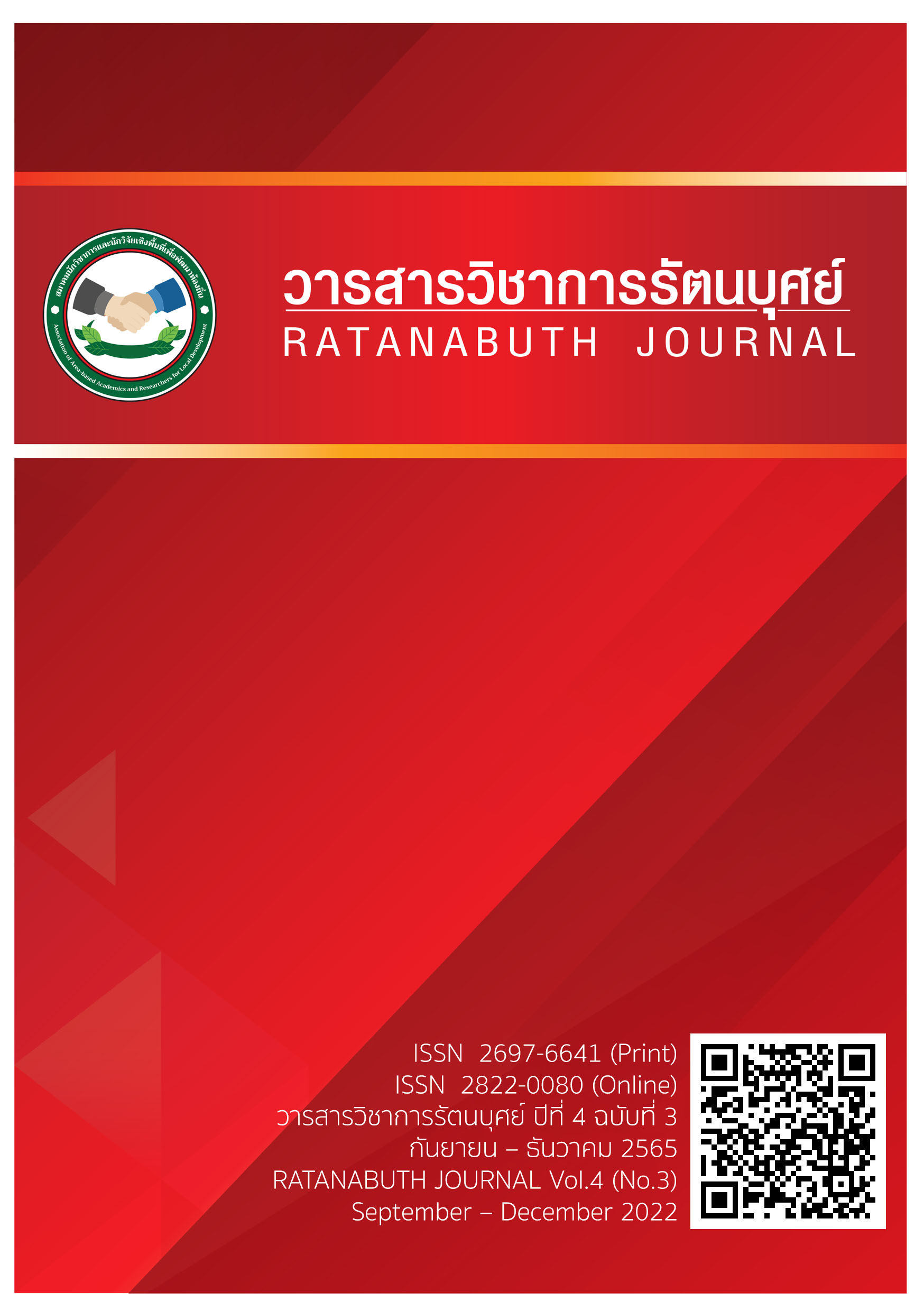Servant Leadership for School Administrators
Main Article Content
Abstract
This academic paper, the author wishes to present the characteristics of school administrators with servant leadership will focus on the value of others and developing others. Overlook their benefits to help others develop, to the Growth of People, Progress and success. They are reducing, canceling, and less controllable management. Create learning opportunities and build the ability of teachers and personnel for these people to become leaders and lead the changes that will happen with creativity. It consists of factors as follows: 1) Empowerment, 2) Service) 3) Awareness, 4) Humility, and 5) Persuasion
Article Details

This work is licensed under a Creative Commons Attribution-NonCommercial-NoDerivatives 4.0 International License.
References
จันทรานี สงวนนาม. (2551). ทฤษฎีและแนวปฏิบัติในการบริหารสถานศึกษา. กรุงเทพมหานคร: บุ๊ค พอยท์.
จิรวรรณ เล่งพานิชย์. (2554). โมเดลสมการโครงสร้างภาวะผู้นำแบบใฝ่บริการของผู้บริหารสถานศึกษาขั้นพื้นฐาน. วิทยานิพนธ์ ศษ.ด. ขอนแก่น: มหาวิทยาลัย ขอนแก่น.
เดชา พนาวรกุล. (2559). ภาวะผู้นำแบบใฝ่บริการ. กรุงเทพมหานคร: มหาวิทยาลัยสมเด็จเจ้าพระยา.
ต้องลักษณ์ บุญธรรม. (2559). การเป็นผู้นำยุคเศรษฐกิจดิจิทัลกับการพัฒนาที่ยั่งยืนขององค์กรทางการศึกษา.วารสารวิชาการครุศาสตร์อุตสาหกรรม พระจอมเกล้าพระนครเหนือ, 7(1), 7-20.
ชัยยนต์ เพาพาน. (2559). ผู้บริหารสถานศึกษายุคใหม่ในศตวรรษที่ 21. วารสารบริหารการศึกษา มหาวิทยาลัยขอนแก่น, 2(1), 4-5.
ธีระรุญเจริญ. (2557). ความเป็นมืออาชีพในการจัดและบริหารการศึกษายุคปฏิรูปการศึกษา(ฉบับปรับปรุง) เพื่อปฏิรูปรอบ 2 และประเมินภายนอกรอบ 3. พิมพ์ครั้งที่ 8. กรุงเทพมหานคร: ข้าวฟ่าง.
พรรษรัตน์ พรมมินทร์. (2563). การพัฒนารูปแบบภาวะผู้นำของผู้บริหารสถานศึกษาในยุคดิจิทัลสังกัดสำนักงานเขตพื้นที่การศึกษามัธยมศึกษา เขต 5 จังหวัดลพบุรี. วารสารสังคมศาสตร์และมานุษยวิทยาเชิงพุทธ,5(8),37 -40.
วิโรจน์ สารรัตนะและคณะ. (2561). ภาวะผู้นำสำหรับศตวรรษที่ 21. วารสารศึกษาศาสตร์ มหาวิทยาลัยนเรศวร.20(1),4-7
สรายุทธ กันหลง. (2553). ยุทธศาสตร์การพัฒนาภาวะผู้นำใฝ่บริการของผู้บริหารมหาวิทยาลัยราชภัฏในภาค ตะวันออกเฉียงเหนือ. วิทยานิพนธ์รัฐประศาสนศาสตรดุษฎีบัณฑิต. กรุงเทพมหานคร: บัณฑิตวิทยาลัย มหาวิทยาลัยราชภัฏวไลยลงกรณ์.
สัมฤทธิ์ กางเพ็ง. (2557). ภาวะผู้นำแบบบริการ แนวคิด ทฤษฎี และงานวิจัย. มหาสารคาม: อภิชาตการพิมพ์.
สัมฤทธิ์ กางเพ็งและสรายุทธ กันหลง. (2553). ภาวะผู้นำใฝ่บริการในองค์การ : แนวคิด หลักการ ทฤษฎี และงานวิจัย. พิมพ์ครั้งที่ 2. ขอนแก่น: คลังนานาวิทยา.
Daft, R.L. (2002). The Leadership Experience. 2nd ed. Fort Worth, Tx: Harcourt, College.
Dennis, R. S. (2004). Development of the servant leadership assessment. Dissertation Abstracts International (UMI No. 3133544).
Dennis, R. S. and Bocarnea, M. (2005). Development of the servant leadership assessment.Leadership & Organizational Development Journal. 26(8).
Greenleaf, R.K. (1970). The servant as leader. Indianapolis. Illinouise : The Robert K. GreenleafCenter.
Greenleaf, R.K. (1977). Servant Leadership. A Journey into the Nature of Legitimate Power and Greatness. NJ: Paulist Press.
Greenleaf, R.K. (2002). Servant Leadership. A Journey into the Nature of Legitimate Power and Greatness. NJ: Paulist Press.
Hughes, RL; Ginnett, RC; and Curphy, GL. (2012). Leadership: Enhancing the Lessons of Experience. 7th ed. New York: McGraw Hill.
Page, D., & Wong, T. P. (1998). A conceptual framework for measuring servant leadership.Unpublished manuscript Langley, Canada: Trinity Western University.
Laub, J. (2004). Organizational Leadership Assessment (OLA) Model. Defining servant leadership and the healthy organization.
Mujis, D. and Garris, A. (2006). Teacher led school improvement: Teacher leadership in the UK. Teaching and Teacher education. (22).
Patterson, K. (2003). Servant leadership: A theoretical model. Doctoral dissertation. Regent University, Virginia Beach, VA. USA.
Poon, R. (2006). A Model for Servant Leadership, Self-Efficacy and Mentorship. Servant Leadership Research Roundtable-August 2006. School of Leadership Studies. Regent
University.pp.1-9. Retrieved from: www.regent. edu/acad/publications/sl_Proceedings/2006/poon.pdf.
Russell, R. F. & Stone. (2002). A review of servant leadership attributes: Developing a Practical Model. Journal of Leadership & Organizational Studies. 23(3).
Sendjaya, S., & James, C.S. (2002). Servant leadership: Its origin, development and application in Organizations. Journal of Leadership and Organization Studies. 9(2).
Spears, L. C.(2004). The Understanding and practice of Servant - leadership. In L.C. Spears,& M. Lawrence (Eds), Practicing servant leadership : Succeeding.
Waddell, T. J. (2009). Servant leadership. Paper presented at the Servant Leadership Research Roundtable, Regent University, Virginia Beach, VA. Retrieved from http://www.regent.edu/acad/sls/ulications/conference proceedings/servant - leadership-roundtable/2006/pdf/waddell.pdf.
Washington, R. R., Sutton, D. C., & Field, S. H. (2006). Individual differences in servant leadership: The roles of values and personality. Leadership & Organization Development Journal. 27(8), 700-716.
Winston, B. E. (2004). Servant leadership at Heritage Bible College: A single-case study.The Leadership & Organization Development Journal, 25(7).
Yukl. G. A. (2002). Leadership in Organizations. Upper Saddle River: Prentice Hall.


